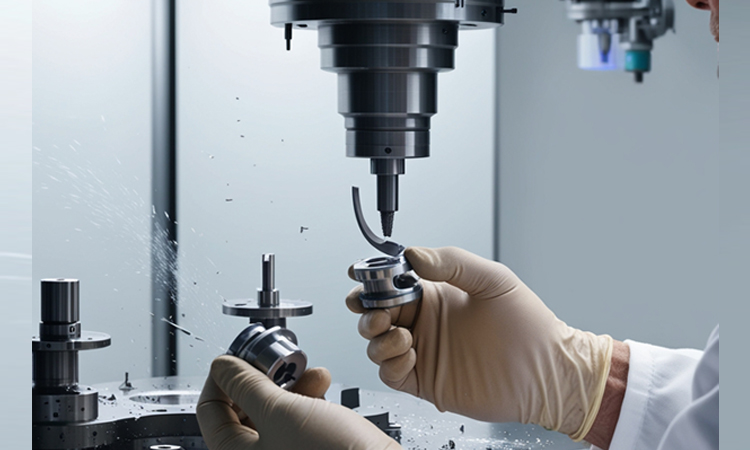The medical implant industry is experiencing unprecedented growth, driven by an aging population, advancements in healthcare technology, and increasing demand for personalized treatment. Precision machining plays a pivotal role in producing high-quality implants, ensuring they meet stringent safety and biocompatibility standards. Globally, the industry is undergoing a transformation with cutting-edge technologies, while India is emerging as a key player with significant investments in advanced manufacturing processes.
Rising Demand for Advanced Materials
One of the major trends in the medical implant industry is the increasing use of biocompatible materials such as titanium, cobalt-chromium alloys, and high-performance polymers. These materials offer the durability, corrosion resistance, and compatibility needed for implants like hip joints, dental implants, and spinal cages.
Globally, titanium accounts for nearly 40% of all implant materials due to its superior strength-to-weight ratio and biocompatibility. In India, the adoption of titanium is growing steadily, with companies like Sushrut Surgicals and Indian Orthopedic Solutions using it to manufacture orthopedic implants.
Growth of Additive Manufacturing (AM)
Additive manufacturing, commonly known as 3D printing, is revolutionizing the medical implant industry by enabling customized, patient-specific implants. Globally, the adoption of AM in the healthcare sector is growing at a CAGR of 22%, with the US, Germany, and Japan leading this transformation.
In India, AM is gaining traction, particularly in dental and orthopedic implants. Companies like Think3D and Wipro 3D are leveraging AM to produce highly precise implants, reducing lead times and costs while meeting regulatory standards.
Adoption of Multi-Axis CNC Machining
The demand for intricate implant designs has led to the widespread adoption of 5-axis CNC machining globally. This technology enables manufacturers to create complex geometries with high precision and smooth finishes, critical for implants to integrate seamlessly with the human body.
In India, the use of 5-axis CNC machining is growing, supported by investments in advanced manufacturing technologies. For instance, the Indian government’s PLI Scheme for Medical Devices, with an allocation of ₹3,420 crores, is encouraging domestic manufacturers to adopt high-precision machining technologies.
Focus on Sustainability and Green Machining
Globally, the implant manufacturing industry is shifting towards sustainable machining practices, such as minimizing material waste and using eco-friendly lubricants. Recycling of scrap materials like titanium and cobalt-chromium alloys is also gaining momentum.
In India, sustainability is gradually becoming a focus area, particularly among export-oriented manufacturers aiming to align with international environmental standards. Indian firms are adopting practices such as minimum quantity lubrication (MQL) to reduce their carbon footprint.
Integration of Industry 4.0
The integration of Industry 4.0 technologies, such as IoT-enabled machines, digital twins, and AI-driven analytics, is redefining the global implant machining landscape. These technologies improve productivity, ensure real-time quality control, and enable predictive maintenance.
Indian manufacturers like Sahajanand Medical Technologies (SMT) are beginning to incorporate these advancements to enhance their competitiveness in the global market. A report by NITI Aayog predicts that Industry 4.0 adoption in India’s healthcare sector could increase efficiency by 30% by 2030.
Surge in Domestic and Global Demand
The global medical implant market was valued at $47 billion in 2023-24 and is projected to reach $72 billion by 2030, driven by a surge in chronic diseases and demand for minimally invasive surgeries. In India, the market for medical implants is growing at a CAGR of 12%, fueled by government initiatives to reduce import dependency and boost local production.
Enhancing Quality Control Standards
Stringent quality control is a defining trend in implant manufacturing. Globally, advanced metrology tools like CMMs (Coordinate Measuring Machines) and optical profilers are being used to ensure precision and traceability.
Indian manufacturers are increasingly adopting these tools to meet international certification requirements such as ISO 13485 and CE Marking, enabling them to access global markets.
The medical implant industry is at the forefront of innovation, with precision machining playing a critical role in shaping its growth. Globally, trends such as additive manufacturing, Industry 4.0, and sustainability are transforming production processes. In India, government support, rising domestic demand, and increased adoption of advanced machining technologies are positioning the country as a significant player in the global implant market.
As the industry continues to evolve, investments in technology, quality assurance, and material science will remain essential for meeting the growing demand for high-quality, precision-engineered medical implants.



